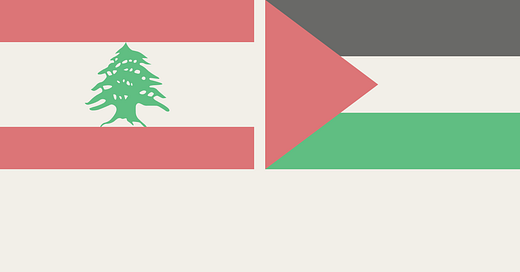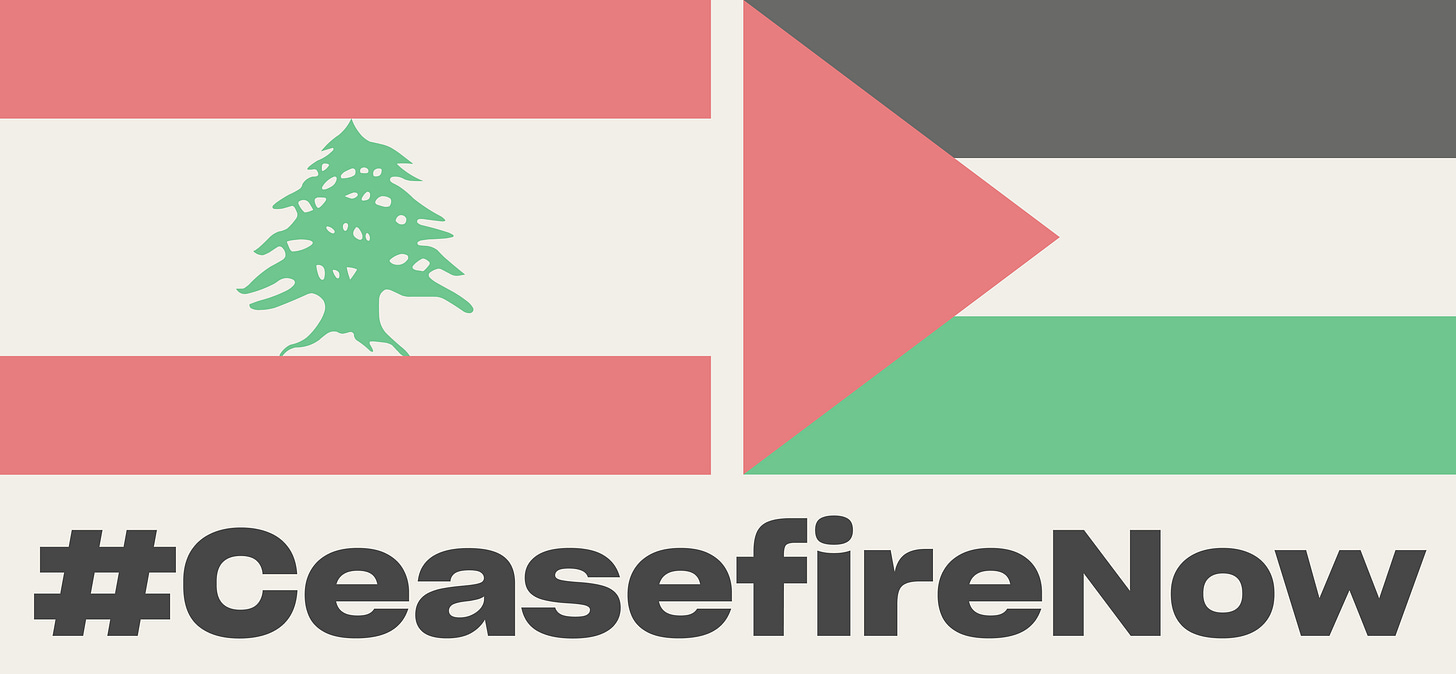#CeasefireNow, and our crisis preparedness grantees announced
Meedan joins the call for an immediate and unconditional cease-fire in Lebanon and Gaza and announces awards for the 2024 cohort of IMRF grantees.
Hi Checklisters,
Today’s newsletter is a return to full coverage. If you’re running late, here’s your TL;DR Checklist:
✅ Join us and hundreds of civil rights organizations to demand an immediate cease-fire in Lebanon.
✅ We’re announcing the list of inspiring organizations who, over the next few months, will be working to elevate hyperlocal crisis-preparedness efforts.
✅ Selected proposals focused on community initiatives in Argentina, Brazil, Indonesia, Lebanon, Libya, Sudan, Taiwan, and Zimbabwe.
#CeasefireNow
It’s been almost a year since we first joined our peers around the world in October 2023 to call for a cease-fire in Gaza. As the months grind on, the situation has deteriorated even further.
Today, we stand in solidarity with our family members, friends, colleagues, and partners in Lebanon as we demand — yet again — an immediate and unconditional cease-fire. We join the call by our friends at the Arab Alliance for Digital Rights to halt all attacks against civilians and the weaponization of digital devices in civilian areas.
Join civil society’s calls for these attacks to be investigated as war crimes.
As the scope of attacks and the range of devastation have expanded across the region, our position remains unequivocally clear: We stand with the journalists risking their lives to report on this war, with the activists, human rights defenders, archivists, and researchers who seek justice, and with all those who put everything on the line to speak truth to power on a daily basis.
If you are working on any crisis-response efforts in Lebanon or Palestine where you think we could be of help, or if you think our support could assist you in the development of any initiatives, please reach out to us now.
Action in anticipation of crises: Hyperlocal preparedness
In July, Meedan launched an open call for proposals to the Independent Media Response Fund (IMRF), an initiative created to provide grants to organizations addressing some of the most complex challenges of our time at the hyperlocal level. This year, the theme focused on action in anticipation of crises, supporting projects engaged in crisis-preparedness efforts.
We received more than 250 applications from 60 countries, with projects ranging from initiatives to strengthen journalism ahead of infectious disease outbreaks to community conversations on the impact of climate emergencies. We’re grateful to all those who submitted their ideas and are delighted to introduce you to the eight organizations we have selected for 2024.
The IMRF is designed to respond to the hyperlocal needs of media practitioners, independent media newsrooms, fact-checking groups, citizen journalism projects, human rights defenders, researchers, and technology and digital literacy advocates in North Africa and Western Asia, sub-Saharan Africa, Latin America and the Caribbean, and the Asia-Pacific region.
IMRF grantees
We’re delighted and inspired by this year’s IMRF grantees, and we’re very excited to introduce you to them.
🇱🇧
The partner’s project will address gaps in existing crisis-response infrastructure by collecting and analyzing data on the community impacts of military escalation in South Lebanon, as well as gathering information about the basic health, infrastructural, and community support needs that result from these attacks. Analyses will be published to raise awareness about community needs and the information will be visualized with an interactive map.
🇸🇩
This initiative will support the efforts of Sudanese media practitioners to address undocumented human rights violations by enhancing their skills in remote open-source investigation. The project will also focus on strategizing and delivering a social media campaign to enhance the spread and reach of open-source investigations.🇮🇩
The grantee will work with Indigenous women in Bengkulu Province to build capacity for local media production and to highlight, from a climate justice lens, their mitigation strategies, adaptive approaches, and perspectives on the impact of climate crises. Content will be distributed as policy outputs and in various creative media formats, including as a graphic novel.The Citizen Bulletin (Zimbabwe Centre for Media and Information Literacy)
🇿🇼
In the Hwange region, this initiative will enhance understandings of climate change and foster resilience to climate threats through the production of reporting on relevant community topics. Potential subject areas include climate impacts on rural farmers and industries, as well as strategies for climate adaptation. Local engagement on key issues will also be strengthened through climate change mitigation training, community listening forums, workshops for citizen journalists, and digital community networks on WhatsApp.
🇦🇷
In this project, which is centered on marginalized neighborhoods in Gran San Miguel de Tucumán, the partner will build digital content distribution capacity and strengthen the digital citizenship of women who are leading the charge for the development of community kitchens as a key intervention to address food insecurity challenges in their communities. Key insights on the food sustainability practices they’ve adopted will be published and distributed.
Lens — Research Laboratory in Media, Entertainment and Society
🇧🇷
Through the creation of board games and creative educational tools, and through the delivery of workshops with community leaders, the partner will improve community preparedness for dealing with potential crisis scenarios in vulnerable areas of Northeast Brazil. The project will focus on building creative pathways for these community leaders to engage with diverse crisis-response stakeholders.
🇱🇾
Our grantee will put together a women-led task force of journalists to develop and promote climate justice content, and they’ll provide training and build capacity to strengthen an early warning system on climate emergencies in the city of Darna, of which 30% was destroyed by a flood last year.
Taiwan Fact-Checking Alliance
🇹🇼
Alliance members: Asia Fact Check Lab, Cofacts, MyGoPen, and the Taiwan FactCheck Center
This alliance will foster a networked coalition of fact-checkers from across Taiwan to coordinate, create collaboration pathways, and develop emergency simulations, drills, and strategies so they can more rapidly respond to misinformation and disinformation while disseminating accurate information during crises.
Contact us to explore collaboration opportunities today.
Define_climate justice
“Since the climate crisis is a human crisis and a political crisis, that means that its solutions need to take into account the messy and complex world of global politics. ‘Climate justice’ as a concept recognises that, although global warming is a global crisis, its effects are not felt evenly around the world. The worst effects of the climate crisis — for example extreme heat, flooding and crop failures — are disproportionately felt by countries and communities in the Global South.”
— Global Witness, “What is Climate Justice?”
Townsquare
Sept. 27-29
The 2024 Global Gathering will take place in Estoril, Portugal, bringing together digital rights networks from around the world. Participants will collaborate, share knowledge, and brainstorm.
Oct. 21-25
The Sexual Violence Research Initiative Forum 2024 will take place in Cape Town, South Africa, creating a vibrant space to connect, share, and learn about holistic, intersectional, and innovative approaches to preventing and responding to violence against women, violence against children, and other forms of violence driven by gender inequality. Meedan’s Nat Gyenes will co-facilitate a workshop on feminist research into digital solutions.
Oct. 29
Our interactive session on gendered disinformation in South Asia is accepting RSVPs right now. We’ll discuss key highlights from the project and make public a collaborative policy report that includes recommendations for how to prevent and respond to these technology-facilitated harms.
Dec. 2-5
The Association for Women’s Rights in Development International Forum will be held in Bangkok and accessible online. Register today to attend the one-of-a-kind convening, which brings together feminist, women’s rights, gender justice, LBTQI+, and allied movements to connect, heal, and thrive.
What else we’re reading
“Our study suggests that educating people about how algorithms work and how information is selected on social media could be a promising alternative; by understanding algorithms better, people may be more equipped to recognize and respond to misinformation. The benefit of this approach is that it could be broadly applicable across different populations and effective globally.”
(Myojung Chung, Nieman Journalism Lab)
“Vilbrun Dorsainvil said he fled his home country, Haiti, after someone tried to kidnap him. Three years later, he says he’s afraid for his and his community’s safety in the U.S.”
(Maria Ramirez Uribe, PolitiFact)
“According to our own Digital News Report, most Brazilians (74%) consume news online, with WhatsApp and YouTube tied as the top platforms for news. X/Twitter used to be the fifth most consumed social platform for news since 2020, but this year it was surpassed by TikTok. According to our data, only 9% of Brazilians use X for news. The figure was 16% in 2020.”
(Gretel Kahn, Reuters Institute for the Study of Journalism)
Did you miss an issue of the Checklist?
Read through the Checklist archive. We’ve explored a diverse range of subjects, including women’s and gender issues, crisis-response strategies, media literacy, elections, AI, and big data.
If there are updates you would like us to share from your country or region, please reach out to us at checklist@meedan.com.
The Checklist is currently read by more than 2,100 subscribers. Want to share the Checklist? Invite your friends to sign up.








